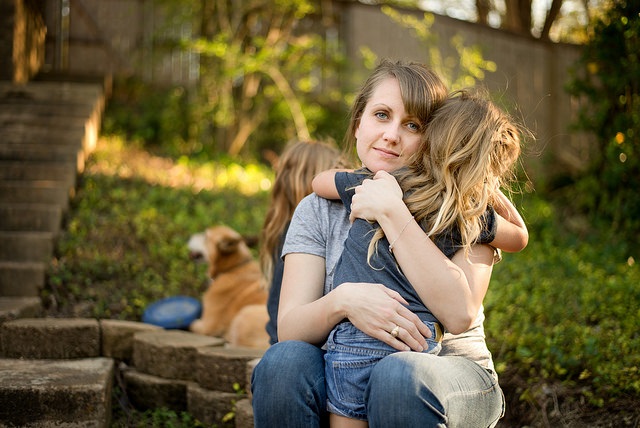The Mindful Parent
By: Jen McWaters, Psy.D. | March 30, 2017

Take a moment to pause and reflect on the word “parent”. If you are a parent, you might be thinking about the daily challenges you face: alone-time is probably non-existent, and despite feeling successful at work or in other areas, you might feel ineffective as a parent (particularly when trying to manage your child’s difficult behaviors). At the same time, being a parent can also be experienced as fulfilling, rewarding, and adventurous. A mother once told me that it is “the hardest and best thing you will ever do.”
In the midst of the chaos and daily challenges of raising a child, it can be easy to lose sight of your values as a parent. A parenting value might mean that what is important to you is having a close, meaningful relationship with your child, or valuing that your child understands the importance of honesty. Parents can quickly get swept up in life’s demands, and high levels of stress can lead to a focus on a child’s behavior at the expense of the relationship. This is not a judgment towards parents, but rather a reflection on the myriad of demands and distractions that pull for our attention every day. Despite these challenges, how can we be more present with our children when it matters most?
What is Mindful Parenting?
Being present is about being mindful. A popular definition of mindfulness (coined by Jon Kabat-Zinn) says that it is “paying attention in a particular way; on purpose, in the present moment, and nonjudgmentally.” As we just acknowledged, given the daily distractions and demands adults face, bringing this kind of awareness into our lives, let alone into our parenting, can seem daunting. The definition of mindfulness also includes the quality of “non-judgment,” which means sticking to the facts without adding labels or opinions. As you can imagine, aside from the challenge of being present, being nonjudgmental towards yourself and others is even more difficult. Parents in particular are experts at being their own worst critic.
How might mindfulness help us overcome these challenges? Aside from the research-proven emotional, cognitive, and physical benefits of practicing mindfulness, mindful parenting can enrich the relationship bond you have with your child. Consequently, when your relationship with your child improves, it becomes easier to parent them.
Steps Towards Mindful Parenting:
A team of psychologists came together to study this topic and suggest that mindful parenting encompasses five domains[i]:
- Listening with full attention
This helps parents accurately understand their child’s experience (thoughts, feelings, behaviors) and then apply an effective response.
How to practice this?
The next time you are interacting with your child, intentionally observe their nonverbal facial expressions, physical movement, and verbal communication; see if you can identify what they are experiencing in that moment.
- Nonjudgmental acceptance of self and child
This does not mean that parents are permissive or that they approve of whatever behaviors their child engages in. Instead, this is about fundamental acceptance of your child as a unique person, just as you are.
How to practice this?
Engage in play with your child and practice curiously observing and reflecting on their play without judging it. For example, notice that you might feel pulled to make judging comments about whether the play is good/bad or fun/boring; or, you might have urges to direct the play in a way that you think is more appropriate.
- Emotional awareness of self and child
Parents are more effective when they understand their own thoughts and feelings and when they can accurately evaluate their child’s feelings. Our thoughts and feelings influence our behavior and parenting responses.
How to practice this?
The next time your child misbehaves, notice what thoughts and feelings come up (anger, anxiety, etc.). Also observe what your child might be feeling. Noticing and being aware that you are feeling angry (or anxious) will give you a moment to pause and decide what would be the best way to respond.
- Self-regulation in the parenting relationship
It is important for parents to model for their child how they would like them to behave in the face of challenges. Children may not know how to regulate themselves in an appropriate way; parents must show children how to effectively manage difficult feelings.
How to practice this?
Engage in self-care regularly so that it is easier to regulate your emotions when your child misbehaves. When they do, take a deep breath, noticing what’s going inside of you and around you (including your child). Decide what would be the most effective response given the information you have, and what actions would be most in line with your parenting values.
- Compassion for self and child
When parents are really hard on themselves, they can also be less compassionate and forgiving in their parenting. This domain is about parents cultivating more self-compassion and forgiveness for their mistakes, which will then lead parents to be more compassionate with their children.
How to practice this?
Notice when you start to have self-blaming thoughts about a mistake you made. Try to cultivate more compassionate thoughts, perhaps forgiving yourself in the same way that you would extend compassion to a friend who was putting themselves down for a parenting mistake. Consider your parenting values and how you are doing your best to be an effective parent.
[i] Duncan, L. G., Coatsworth, J. D., & Greenberg, M. T. (2009). A Model of Mindful Parenting: Implications for Parent–Child Relationships and Prevention Research. Clinical Child and Family Psychology Review, 12(3), 255–270.
Image: Donnie Ray Jones on flickr and reproduced under Creative Commons 2.0



